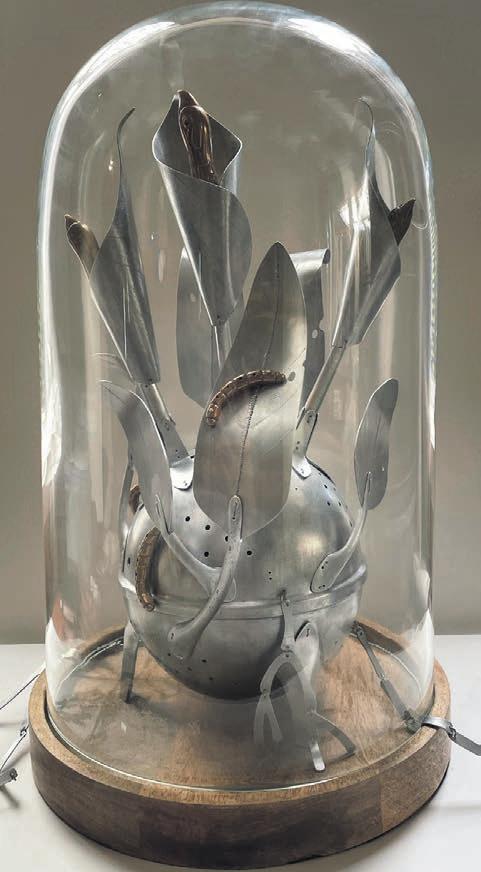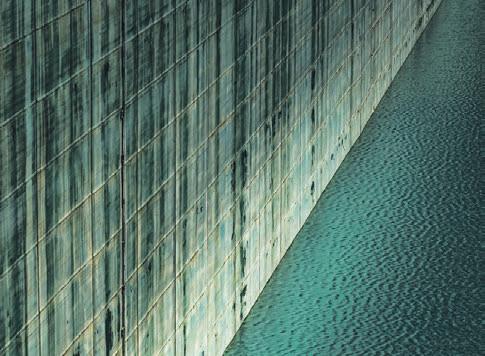
4 minute read
Extra
A healthy dose of Surrealism
Sometimes what you need is a nice healthy dose of Surrealism to help you think about life right now.
Te Papa Tongarewa has the Surrealist exhibition on display, so Aratoi’s educators went on a fi eld trip to get immersed in Surrealism before our own Surrealist show, The Disappearing Woman was staged.
Our main thought was about cause and eff ect. If there hadn’t been a war, would there have been a Surrealist movement to counteract the madness of the war?
It’s an intriguing idea to think about, especially when you look at our newest exhibition, The Disappearing Woman.
At fi rst glance, this Victorian parlour is adorned with texture and interesting items, including plants, cloaks and furniture. Then as you look closer, these innocent items aren’t what they fi rst appear.
Small bird heads are growing from inside a mischievous metallic overgrown plant that has broken free of its cage.
A pair of beautiful gloves are laying on a chair, but on closer inspection, these gloves have talons and have broken an egg from a nest that is coming out from the furniture behind.
On the walls there are snapshots and hints of René Magritte, Remedios Varo, Elsa Schiaparelli and Salvador Dali, displayed similarly to how a proud parent would show off portraits of their family in a domestic setting.
Everywhere you look there are clever details that make you look twice.
Then you notice the pair of feet, splashing into a footstool. You can almost feel how cold the water must be from looking at the glistening spray left behind. Where has this woman gone and why did she leave?
The Disappearing Woman is showing at Aratoi until September 5. The exhibition was curated and set-designed by Keren Chiaroni and includes work by threadwork artist Cathrine Lloyd and jeweller Emily Eff ord. Workshops and a competition run alongside this exhibition.
• For more information, visit: https://www. aratoi.org.nz/
Emily Efford’s Disobedient Plant. PHOTO/SUPPLIED
A CLIMATE FOR CHANGE Embedded emissions a critical metric
Chris Peterson
For me, the strongest argument perhaps against the proposed $100m-plus Wakamoekau Water Storage Reservoir is an emerging issue that hasn’t yet been on the table – the matter of embedded or upfront carbon emissions produced in the construction phase of the project.
If we are to have any chance of staying within 1.5 degrees of global warming, the science indicates that this may very soon be the most critical metric in the evaluation and cost-benefi t analysis of everything we do, anywhere.
I don’t profess to be a climate expert but from what I have read, it goes like this. To achieve that 1.5 goal, there is a known amount of greenhouse gas we can emit worldwide. This is the ‘carbon budget’, which is in the order of 400 gigatonnes or so.
As it is now, the world emits roughly 40Gt per annum. So, the maths is simple: 10 x 40 = 400. Therefore, we have this decade to radically adjust our ‘business as usual’ behaviour and

The matter of embedded or upfront carbon emissions produced in the construction phase has emerged. PHOTO/MAREK PIWNICKI drastically reduce our gross emissions. The Intergovernmental Panel on Climate Change [IPCC] puts it at a 45% reduction by 2030, which is fi ve per cent pa if we start now – or nine per cent pa if we leave it to the last fi ve years. As the landmark Stern Review said: the longer we delay, the more diffi cult and expensive it all becomes.
Presently the ‘developed world’ [which includes us] hogs far more than its fair share of that 40Gt – and furthermore, developed countries largely created the climate crisis through their profl igate use of fossil fuels to underpin their growing prosperity over the 200-odd years since the start of the Industrial Revolution. Climate justice means we in the developed world now need to consider achieving more than just our fair share of emission reductions.
The amount of carbon emitted in the upfront construction of all projects then becomes of paramount importance in any cost-benefi t analysis. Even more so than the operational carbon produced over its lifetime.
In evaluating projects like the Wakamoekau dam, we should therefore be asking the question – is this the best use of our limited and fi nite share of that precious and everdiminishing global budget?
• Chris Peterson is a
Masterton district councillor and member of Forest &
Bird and Sustainable
Wairarapa.
DO YOU HAVE A LUCKY DOG?
Dog registrations are now due. Register before 31 July and your dog will go into the draw to win one of three prize packs full of REGISTER BY 31 JULY goodies for them and their families. There are a range of ways to pay, including online and weekly payments. To talk about payment options, call the Animal Services team on 06 370 6300 for information or email: animalservices@mstn.govt.nz


